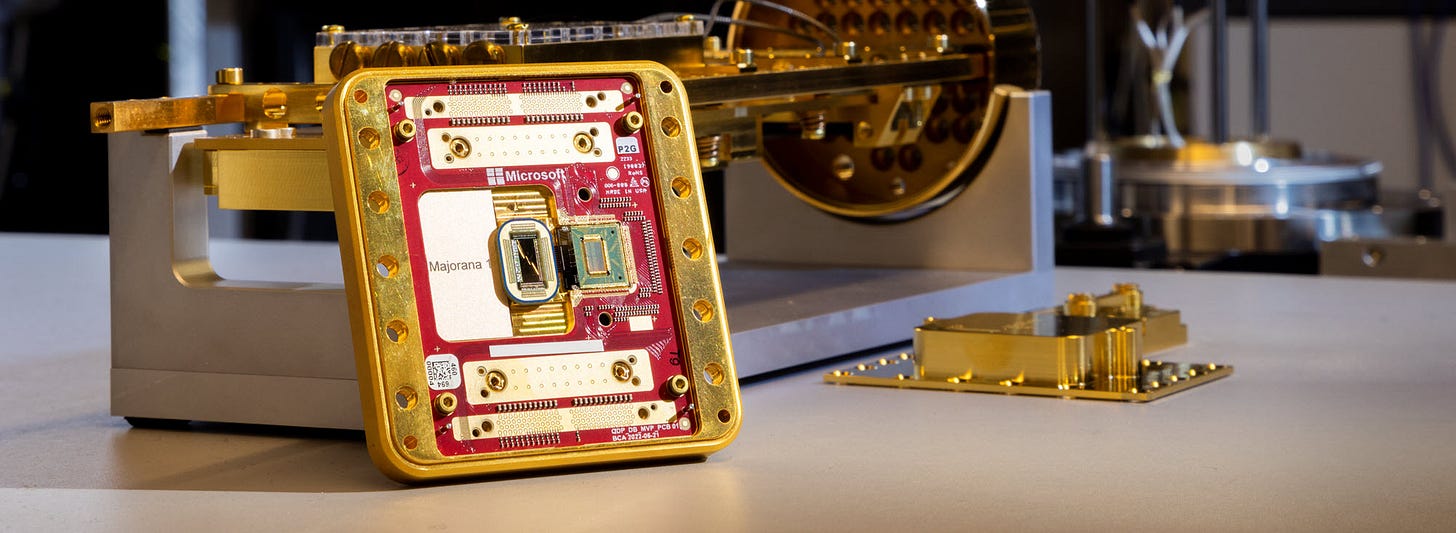When we think of matter, we’re taught there are three primary states: solid, liquid, and gas. But what if there’s a fourth? Microsoft just unveiled a groundbreaking discovery that challenges this fundamental understanding of physics. Meet the Majorana 1 chip, the world’s first quantum processor powered by a topoconductor—a material that taps into an entirely new state of matter. This isn’t just a scientific curiosity; it’s a leap that could bring practical quantum computing to the world in “years, not decades”.
What is a Topoconductor?
A topoconductor, or topological superconductor, isn’t a solid, liquid, or gas. It’s a topological state of matter, a concept theorized for nearly a century but never realized until now. Microsoft’s team, after 17 years of research, has finally brought this theoretical state to life. By combining indium arsenide and aluminum in a meticulously designed materials stack, they’ve created a platform for Majorana particles—exotic quantum particles that don’t exist in nature but can be coaxed into existence under extreme conditions.
These particles are key to the Majorana 1 chip’s design. Unlike traditional qubits, which are fragile and prone to errors, topological qubits are stable, fast, and digitally controllable. This stability comes from the unique properties of Majorana particles, which “hide” quantum information, making it resistant to environmental noise and errors.
Why This Matters for Quantum Computing
Quantum computing has long been hailed as the future of technology, promising to solve problems that are impossible for classical computers. But progress has been slow, largely due to the challenges of scaling qubits—the building blocks of quantum computers. Current qubits are finicky, requiring extreme conditions and complex error correction. Microsoft’s topological qubits, however, are a game-changer.
The Majorana 1 chip is small enough to fit in the palm of your hand, yet it has a clear path to scaling up to one million qubits. To put that in perspective, a quantum computer with a million qubits would be more powerful than all the world’s current computers combined 49. This scalability is crucial for tackling real-world problems, from breaking down microplastics to designing self-healing materials and revolutionizing drug discovery.
A New Era of Computing
Microsoft’s breakthrough isn’t just about building a better quantum computer; it’s about redefining what’s possible. The company compares the topoconductor to the invention of the semiconductor, which paved the way for modern electronics. Just as semiconductors enabled the smartphones and laptops we use today, topoconductors could enable quantum systems that transform industries like healthcare, energy, and materials science.
For example, imagine a world where engineers can design new materials or molecules in plain language, and a quantum computer instantly provides the perfect recipe. Or consider the potential for sustainable agriculture, where quantum simulations optimize crop growth in harsh climates. These aren’t distant dreams—Microsoft believes they’re within reach in just a few years.
The Road Ahead
While the Majorana 1 chip is a monumental achievement, there’s still work to be done. Scaling up to a million qubits will require further engineering breakthroughs, and integrating these systems with AI and classical computing platforms will be a complex challenge. But Microsoft’s progress has already caught the attention of organizations like DARPA, which sees this technology as a viable path to utility-scale quantum computing.
As Microsoft CEO Satya Nadella put it, “Sometimes researchers have to work on things for decades to make progress possible.” The Majorana 1 chip is the result of nearly 20 years of persistence, and it’s a testament to the power of long-term investment in groundbreaking science.
Final Thoughts
Microsoft’s Majorana 1 chip isn’t just a step forward in quantum computing—it’s a leap into a new frontier of science and technology. By harnessing a new state of matter, Microsoft has opened the door to a future where quantum computers solve some of humanity’s most pressing problems. And if the company’s predictions hold true, that future might be closer than we think.
So, here’s to the topoconductor—a material that could redefine computing, just as the semiconductor did decades ago. The quantum age is coming, and it’s arriving faster than anyone expected.
What do you think about this breakthrough? Could quantum computing change the world as we know it? Let’s discuss in the comments!



This is truly amazing! I was just thinking, I volunteer at the park in my community and most of the underprivileged people around me still haven’t started to benefit from AI. I’ve been trying to help some but what are these innovations good for if they don’t help the masses. I need guidance on how to do this!